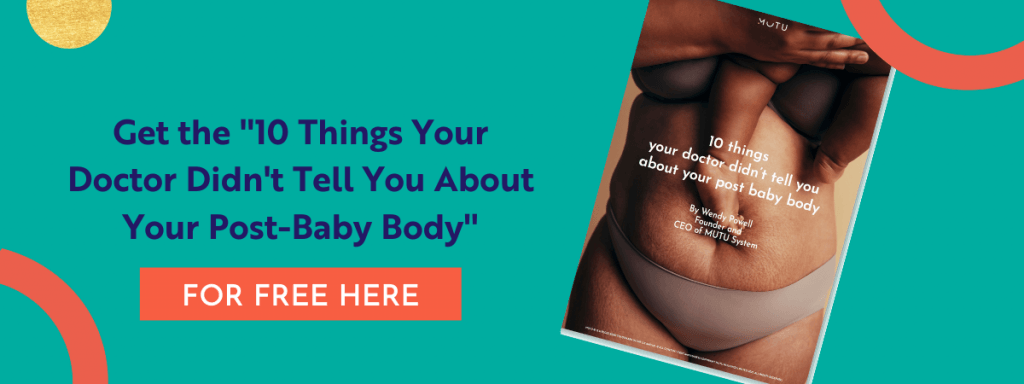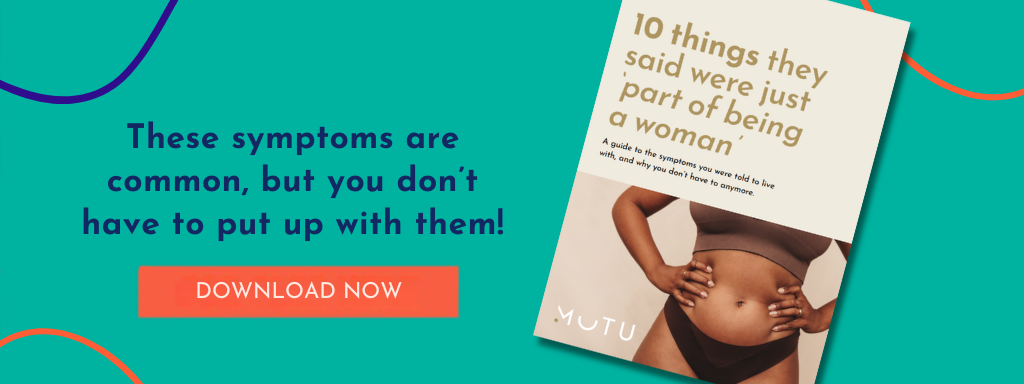Dealing with incontinence, prolapse symptoms or painful sex isn’t like having a broken arm or a sprained ankle. Our pelvic health *is* our mental health. These issues directly impact our intimate relationships, confidence, happiness and everyday confidence. When I started talking about this connection, the concept was picked up by Happiful magazine, Balance Media, Mental Health Today and Marie Claire and others. I clearly struck a chord. This stuff matters to women’s mental health and happiness.
Pelvic health is mental health
As mothers, our pelvic health impacts mental health. Pelvic health, just like our mental health, is equally as vulnerable to trauma. It can leave us feeling alienated from our body and lacking control.
Your postpartum (including your very postpartum) body looks and feels different. You may feel disconnected or unrecognisable. And if you had a traumatic birth experience, you may feel bitter, sad or depressed about how it went. We feel out of control, powerless to complete even the simplest of tasks, all of which has a mental health impact of the same proportion to the physical struggles.

Childbirth can bring about physical symptoms including urinary incontinence, pelvic organ prolapse, painful sex, and diastasis recti. That’s a bunch of technical words for; wetting yourself when you jump, laugh or sneeze, feeling like your insides might fall out when you go to the loo, sex that hurts, or a tummy that bulges and feels unstable. Of course these changes to our body have an impact on us mentally.
Pelvic health impacts mental health – the stats
These changes are not determined by age, nor fitness, size or diet. You could be a brand-new mother, a mother to teens, a grandmother. For a woman who develops postnatal incontinence in her 30s, this could mean 50 years of bladder weakness. Contrary to popular belief, this is not an ‘old woman’s problem’. Almost 1 in 4 women between the ages of 18 and 44 experience incontinence.
In a recent customer survey, we found that 87% of women said that dealing with pelvic health issues had affected their mental health.
Women living with urinary incontinence have been shown to have a significantly lower quality of life compared with those who are continent [1], and it’s far more common than you might think.
Incontinence affects almost half of all women [2], while 50% of postnatal women experience pelvic organ prolapse with symptoms of bladder and bowel dysfunction [3]. Perhaps this could go some way to answer why approximately 68% of women with mental health problems are mothers [4].
This impacts every element of a woman’s life, including their career. In a MUTU System study of 150 women in April 2020, 41% said they have taken time off work for health issues that they did not feel comfortable discussing with their boss, 30% said pelvic health affected their performance or focus at work and 36% felt anxious and embarrassed in the workplace due to pelvic health issues.
Mental health stigma for Moms
The stigma attached makes 75% of women with incontinence suffer in silence. Those that do seek help take on average 6.5 years 10 to do so. This seriously impacts mental health, doubling the risk of postnatal depression. Sufferers can experience humiliation, fear and anxiety over becoming incontinent in public and distress at others finding out. It can also cause loss of sleep and sexual dysfunction.

Painful sex
The 6-week postpartum check by your GP or OBGYN generally means you’ve been given the all-clear to resume sexual activity and exercise again (10 weeks normally for c-section births). But the reality for so many women is far less simple.
Post-partum sex can be uncomfortable and upsetting. What was once seen as the intimate connection between yourself and your partner turns into a painful chore for some women. You may even begin to feel like you are failing as a partner like you no longer have the confidence to be able to contribute to a physical and mental relationship, and the taboos surrounding the issues keep everything chained up inside of you.
So what can be done? Do we accept that this is the price to pay for having a child, learn to come to terms with the fact that we will no longer be able to do the things we used to do because we have made the choice to bring life into the world? Do we accept that intimacy feels different, or even painful– and should conform to stigmas and stereotypes by keeping it under wraps?
Please don’t suffer in silence. Our pelvic health needn’t define our lives as women. The truth is, it is not an irreversible issue and we do have the power to make a change.
94% of MUTU System customers on the postpartum recovery programme claimed to feel better in and about their bodies, including 97% who said they could now find and engage their pelvic floor muscles, and 88% who said that sex was less painful [5].
What can you do?
We need to learn to locate, engage and relax the pelvic floor muscles, let go. Not just physically, but mentally too. Even the strongest of women have to rebuild their core strength and pelvic floor muscles post-childbirth.
Global award-winning artist P!NK recently took to Instagram live with her fitness trainer Jeanette Jenkins (The Hollywood Trainer) where it was revealed that she followed the MUTU System exercises for her post-childbirth routine.
You understand now how closely pelvic health is tied to mental health so don’t let another day go by without caring for your body! Start to connect to those important pelvic floor muscles and begin to take back control and improve urinary incontinence today.

References
[1] Sinclair AJ, Ramsay IN. The psychosocial impact of urinary incontinence in women. The Obstetrician & Gynaecologist 2011;13:143–148.
[2] British Urological institute
[3] (Hagen et al 2004)
[4] Royal College of Psychiatrists. (2016).
[5] 2018 MUTU System customer survey of 906 people












